Duchy steps in over rising tide of abandoned boats
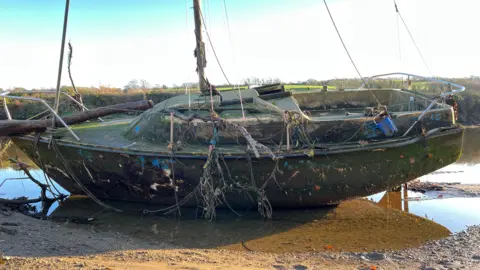 BBC
BBCPrince William's estate the Duchy of Cornwall is stepping in after concerns were raised about dilapidated hulks on a south Devon river.
The duchy, which owns the riverbed on the River Avon between Aveton Gifford and Bigbury, said it was "working in conjunction with our moorings manager to deal with a small number of abandoned boats".
Locals have raised their fears about six boats, one of which is almost covered by water at high tide and the potential pollution from fuel and oil on board.
The rising number of abandoned boats has led to a headache for harbourmasters, especially in popular sailing areas like the South East and South West, according to the British Ports Association (BPA).
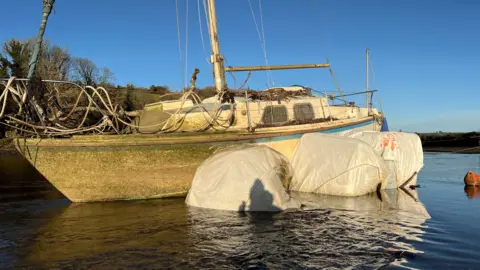
The abandoned boats have grown in number over the last couple of years said local wildlife artist John Ashton who gets much of his inspiration from the river.
"It's getting worse year by year," he said.
"Up to about 10 years ago everything was pristine here.
"There are more wrecks here now than I have ever seen and I've been here for about 40 years."
Mr Ashton admitted that identifying the owners could be difficult because there was no legally-enforced recreational boat registration in the UK.
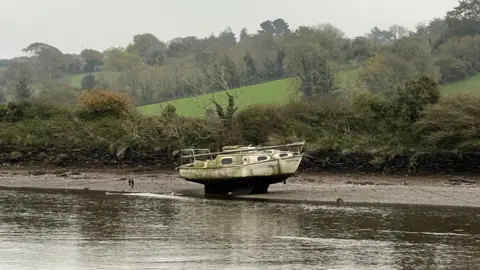
The BPA said in a 2022 report that boat abandonment had "increasingly become an issue in some ports, harbours and marinas".
A report for Department for the Environment, Food and Rural Affairs (Defra) in February concluded that "recreational vessel abandonment is set to become an increasingly large problem".
A lack of regulation and legal registration of boats in the UK could result in vessels being dumped, it said and vessel registration was an "essential" step forward in tackling the problem.
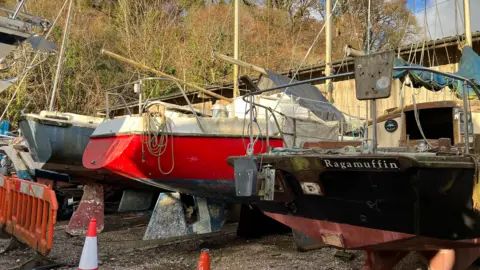
Chris Craven, who owns the Creekside Boatyard on the River Dart, has a row of about six boats that have been abandoned by their owners.
"It's like I'm an unlicensed refuse tip," he said.
"You don't want them sinking in the river because that causes an even bigger problem and damages the environment.
"So sometimes you feel morally obliged to get the boat out of the water to stop the area you love getting polluted.
"They all have oils, fuels, greases and paints in them and we just can't afford to have them uncontrolled in the river."
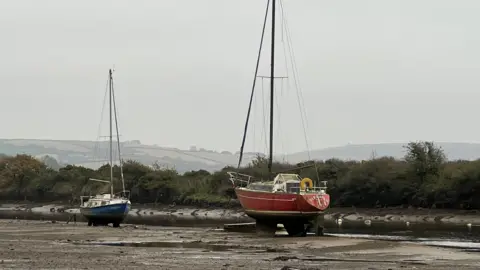
Mr Craven said "at a conservative estimate" there were at least 100 abandoned boats on the Dart.
"It would take two to three weeks to dismantle each one which we won't get paid for, it's not economic," he said.
"We are losing storage space and we just don't know what to do with them."
'End of their life'
In the Spring, Mr Craven's boatyard was involved with a pilot recycling project with South Hams District Council and marine environmental specialists Blue Parameters to recycle an abandoned boat.
The successful disassembly, reuse and recycling of the fibreglass boat "proved to be time efficient, and a great deal was learned during the process", the council said in a report.
James Scott-Anderson of Blue Parameters said: "As a single boat project it's not economically viable, but if you look at it on a much larger scale, with the very high value of stainless and aluminium and other metals that come off boats, it can get to a point where it can break even.
"Glass fibre and composites started being used in the late 60s and early 70s to make boats.
"What's happening is now 40 odd years later those boats are literally coming to the end of their life.
"We currently have a trickle but it'll become a wave of these boats which don't have any further use and there will literally number in their thousands in a very short space of time."
The Royal Yachting Association encourages anyone who sees a boat which they think has been abandoned to report it.
Follow BBC Devon on X, Facebook and Instagram. Send your story ideas to [email protected].
